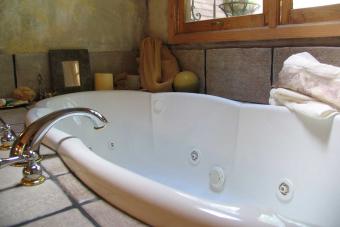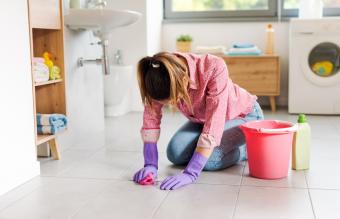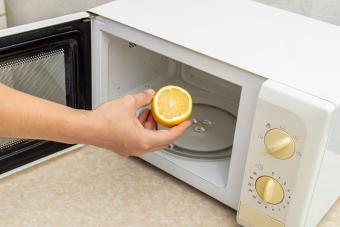
Confession time: I thought I had a pretty clean house, but our recent rescue of four kittens showed me otherwise (those little boogers get into and under stuff like little dirt inspectors). They'd dive under a piece of furniture and come out covered in dust bunnies.
Realizing that I wasn't nearly as clean as I thought I was came as a shock to my system. But it also sent me on a journey of really digging in deep and finding all those dirty spots I completely forgot about — even places the kittens couldn't access.
Washing Machine

It literally has the word 'washing' in the title, so it's probably a place that you never realized needed cleaning. It didn't really occur to me, but most manufacturers recommend that you clean your washing machine at least once a month. It's a monthly chore that shot straight to the top of my list, and I have to say — I really love tossing my clothes in a sparkling clean washer.
It's easy to do and doesn't take a ton of time. Follow ourstep-by-step instructions for cleaning your washer inside and out.
Why would you need to clean a machine that's designed to clean? The answer is simple — soil and detergent buildup. Both of these types of debris can clog up your machine's pipes, and they can even cause mildew and mold to grow.
Kitchen Sink

Guess what? My cats love to hang out in my kitchen sink. And anything they find in there is fair game for eating, licking, rolling in, or batting around.
I've always been fairly diligent about cleaning my kitchen sink after using it, but finding a cat rubbing his nose up against a little blotch of grease that was still in the corner of my rectangular sink made me realize I wasn't doing enough. After looking into it, I realized that even with a cursory cleaning, my kitchen sink harbors more germs than my toilet. Ew!
University of Arizona Professor Charles Gerba, otherwise known as Dr. Germ, is one of the nation's foremost experts on environmental microbiology, and he notes that "most people are unaware that the kitchen sink is one of the germiest places in the house; it's even more contaminated with bacteria than the toilet bowl and garbage can."
Need to up your cleaning game in the kitchen sink? Scrub it with soap and hot water after you load your dishwasher each day. If you've done something super germy — like prepping raw chicken in the sink — wipe the surface down with disinfectant wipes, or mix water and white vinegar at a 1:1 ratio in a spray bottle and clean it that way. If you have a stainless steel kitchen sink, follow our easy instructions to clean it.
Replace dish rags every week and sponges every two weeks (or more often if you're doing germy stuff in the sink). These items are the perfect spots for bacteria to grow, so staying on top of swapping them out can make a big difference in how clean your sink is.
Jetted Tubs

When I stay in hotels with jetted tubs, I always give them a little bit of a side-eye because I'm absolutely certain that there's other people's body funk lurking in the jets. And it turns out, I need to give the same side-eye to my tub, even though the body funk in those jets is my own. Whirlpool tubs have dangerous bacteria and mold lurking inside them. This is because the pipes don't always fully drain, which leads to microbial growth — which doesn't seem super clean or relaxing.
Deep clean your jetted tub at least once a month. If you want to make the task easier, fill the tub with hot water after each soak, along with half a cup of white vinegar, and run the jets for an extra 10 to 15 minutes. Then, allow the tub to drain.
Related: How to Deep Clean a Jetted Tub
Light Switches

As I was scrubbing my walls, my eyes wandered up to my light switches. They weren't as pristine as the day I installed them.
It's no surprise, really, because high-traffic areas are prone to getting dirtier than other surfaces, and light switches definitely see a lot of traffic. Wipe them down once a week with a disinfecting wipe to get rid of any germs.
If somebody in the house is sick and touching those light switches, wipe them down daily.
TV Remotes

Think about how many hands touch your remote and what they've been doing just before (or even during) that touching. Yeah. Gross. A once-a month cleaning of your remote control should be a priority, but clean them more frequently if they get a ton of use or if someone who's using them is sick.
Door Handles

Speaking of spots that are touched regularly, another one that tops the list of things to clean in your house is your door handles. Just like with the light switches, every member of the household touches these surfaces multiple times a day.
Not only that, but you touch them after you put on your shoes, when you take out the trash, and after coming home from the grocery store, where you likely touched a dirty cart handle. Clean door handles once a week with a disinfectant to limit the spread of germs.
Drink Dispensers

This one is a bit startling, but your coffee maker may be another spot brimming with bacteria. Did you know that you need to actually clean the machine and not just replace the filter?
It's recommended you clean the water reservoir with soap and hot water at least once a week. Also, if you're a regular coffee or tea drinker, you should descale your coffee maker or Keurig every three months. You can easily do this with a water and white vinegar solution.
Don't forget about your stand-alone water dispenser either! Manufacturers recommend cleaning these machines every three months. They typically include instructions in their user manual, but you can also hire a professional to do the job for you.
Sink Aerators

I know what you are thinking — what the H-E-double L is a sink aerator? It's the mesh screen disk that sits where the water comes out of the faucet.
I want to warn you — if you've never cleaned these areas of your home and you live in a part of the nation with hard water, what you're about to find is startling. White calcium deposits form on this part of your sink from just running the water. And because it's located on the underbelly of the spout, you've probably missed the buildup for a while.
Thankfully, for most people, the cleaning method is simple. Take a quart-sized zipper-sealed baggie and fill it halfway up with white vinegar. Then, submerge the sink head in the vinegar and adhere the baggie to the spout using a rubber band. Let it sit for 15 minutes, and watch as the calcium buildup magically melts away!
Once this is done, gently scrub the aerator with a toothbrush and break away the remaining deposits! For those with more buildup (like if you've never done it before), you may need to repeat this process a few times.
Never use vinegar on aluminum or copper. Always take the time to spot-check your cleaning products on an inconspicuous part of the area that you plan to clean to determine if they are compatible before applying the product anywhere else.
Pillows

You don't often think about it, but pillows can be pretty gross. Even with pillowcases protecting them, these home accessories can be filled with sweat, skin cells, saliva, pet hair and dander, dust, mold, and many other allergens that can make you sick. Take the time to wash your pillows at least every three months, and you can breathe much easier during the night.
For those sweaty sleepers and the folks who are recovering from an illness, it can be a good idea to increase the frequency of your washings. Aim for close to once a month to help keep your pillows clean.
Mattresses

Just like your pillows, your mattress can be a breeding ground for allergens and dust mites. Studies show that vacuuming your mattress daily can greatly reduce the instances of these critters and irritants, but who has time for that? While the daily cleanings are best, if you aim to do this once or twice a month, it will probably be enough.
Related: How to Clean a Memory Foam Mattress
Letting direct sunlight hit your bed can help dry out the dust mites, and running a dehumidifier makes this potential dust mite home less hospitable. I've invested in a waterproof mattress cover to limit my mattress's exposure to these irritants altogether.
Related: How to Clean a Pillow-Top Mattress
Bathroom Rugs

Bathroom rugs have always squicked me out because all I can see when I look at them are other people's germs. So I don't have bathroom rugs — I use wooden bath mats (that I also clean regularly).
But if you have them, consider this: dirt, dust, debris, and possibly urine are all lurking on your bathroom rugs. Since these bathroom accents live on the floor, they require a little extra TLC than other home accessories. Aim to wash these once a week, if possible. And don't forget other commonly overlooked spots in your bathroom, too.
If you have the money to invest in Ruggable brand rugs, these can make regular cleanings and even quick redecorating a breeze! Peel off the top layer and toss it in the wash like you would with any other linen.
Baby Changing Table Surfaces

It has been a while since I had any kind of a baby other than our kittens. But for the folks who have little ones in diapers, you're probably not getting your changing table clean enough (or cleaning it often enough).
It's easy to do. Wipe your pad down with soap and hot water or a disinfectant wipe. Do this every few days unless you use a liner. I know someone who uses puppy pads to line their changing table because they're so easy to clean up.
Sign up for our newsletter featuring all the latest stories and products we love.
Dryer Vent

Dryers are another appliance that we don't often think to clean, but this lack of TLC can have big repercussions. Even if you take the time to clean out the lint trap after every cycle, this debris can build up and can serve as the perfect kindling for a fire.
Thankfully, cleaning a dryer vent requires minimal effort. Just grab your vacuum hose and the handy attachments that most of us never use, and use the combo to suck out the alarming number of dust bunnies that have set up shop just below where your hand can reach.
While most folks can get away with doing this a couple of times a year, if you have multiple kids and pets, you probably do a lot more laundry and have a lot more debris living in your lint trap. This can make monthly cleanings a good idea.
Makeup Brushes

Dirty makeup brushes can cause an infection, and it can be super serious. So you should wash your makeup brushes every seven to 10 days. Soap and hot water can do the trick, but there are also natural ways to disinfect your brushes for after big breakouts or when you're recovering from an illness.
Pet Bowls & Toys

I want my kittens to live long, healthy lives. And their mouths are filled with dangerous bacteria (just like with other pets — or humans). That means that anything they lick or chew probably contains these same pathogens.
The best way to limit these germs is to clean your pet bowls after every use (I have a rotating supply) — don't worry, this is easier than it sounds — and to wash their toys at leat once a month. By adding these tasks to your chore chart, you can ensure that you and your pets stay healthy.
Humidifier

We sleep with a humidifier — especially during the winter. And while my hubby thinks it's okay to fill it again and again without cleaning it, I worry that it will spew mold into the air if I don't clean it regularly. It may surprise you, but the Environmental Protection Agency (EPA) advises users to clean their humidifiers every three days. They also recommend wiping down all the surfaces of your humidifier and changing the water each day.
Keeping Up With Keeping Clean

Staying on top of all the things to clean in your house is a big task. Creating a cleaning schedule can make the process easier. I have a simple checklist on my computer that I pull up every day to see what needs to be done that day.
Doing so has made me feel more at ease in my home, and we're thoroughly enjoying not seeing our kittens covered in dust bunnies.







